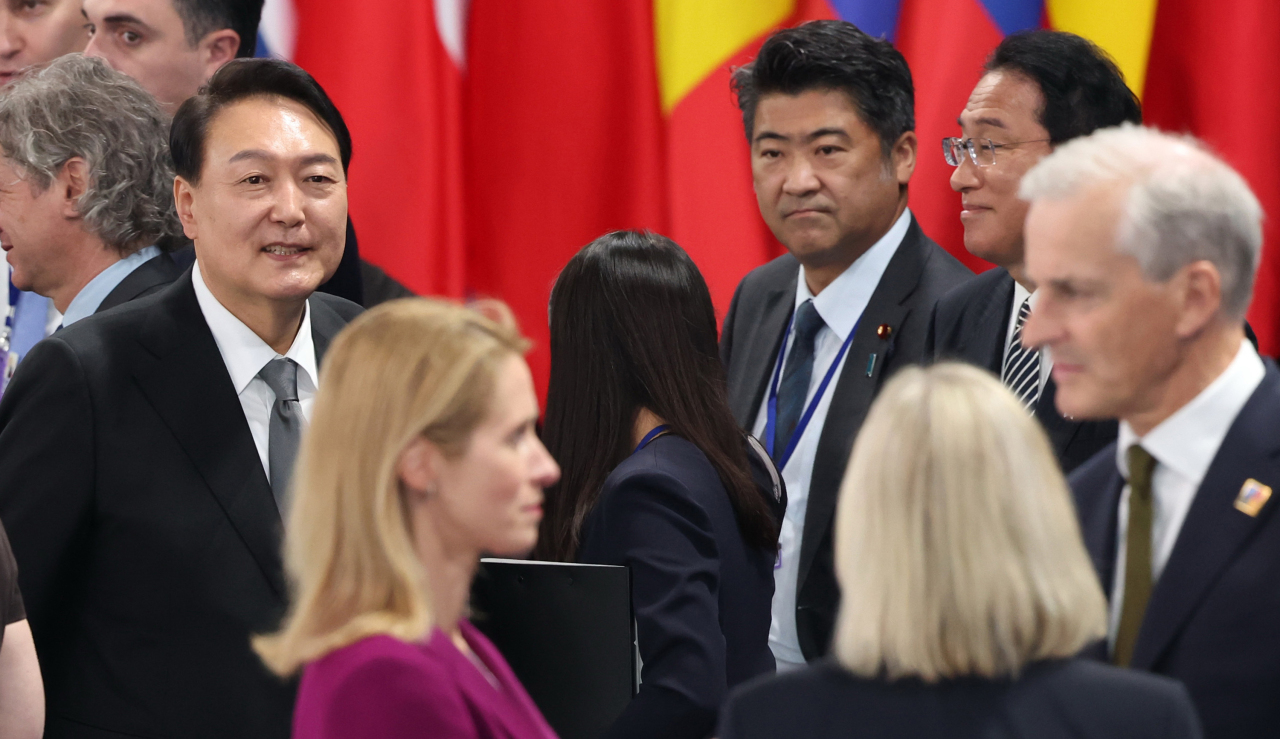MADRID -- The South Korea-Japan bilateral summit some had hoped for did not materialize, but both nations’ leaders appeared sincere at this week’s NATO summit about wanting to improve relations.
The invitation of the two countries to the Western military alliance gathering in Madrid, Spain, drew attention to the possibility of a bilateral summit between President Yoon Suk-yeol and Prime Minister Fumio Kishida.
As Yoon -- even during his presidential campaign -- has promised to restore relations with Japan, which have been at a standstill for several years, and Kishida is also seen as more dovish than his predecessors, there was anticipation that the countries’ relations would improve under the two administrations.
However, the lack of a one-on-one meeting was taken by some watchers as indicating a lukewarm attitude from Japan toward engaging Seoul.
Yoon and Kishida, did however, meet -- somewhat awkwardly -- at the dinner party hosted by Spain’s King Felipe VI on Monday, the day they arrived in the Spanish capital.
According to the presidential office, Kishida approached Yoon first and congratulated him on his inauguration and his party’s victory in the local elections.
In response, Yoon wished him good results in the upper house election, and told the Japanese about his willingness to resolve issues.
“My aides and I are of the mind to take bilateral relations in a future-oriented direction by quickly resolving current issues in Korea-Japan relations after (Japan’s) upper house elections,” Yoon was quoted as saying by his office.
The Japanese leader responded in kind, saying “(I) am aware that President Yoon is making efforts for Korea-Japan relations,” and that the two countries should work to establish “healthier relations,” according to Yoon’s public relations office.
The conversation lasted three or four minutes, and the two leaders decided to continue the discussion at the Korea-US-Japan summit the next day.
The next day, they met again at a four-way summit that also involved Australia and New Zealand. Earlier, the presidential office told reporters the summit was canceled without specific reasons, but it was revived at the last minute.
During each other’s speeches, which were open to reporters, Kishida took notes while Yoon was speaking, and Yoon nodded his head during Kishida’s remarks.
After the talks, when asked by reporters about his first impressions of Kishida and the prospects for Korea-Japan relations, Yoon said, “We had a little conversation at the dinner, and we spent a long time in a four-way Asia Pacific meeting (today).”
“The impression I got is that I am convinced that Prime Minister Kishida can become a partner who can solve issues between Korea and Japan and develop bilateral relations for the common good of the two countries in the future.”
In the subsequent Korea-US-Japan summit, the two countries emphasized the need for security cooperation between South Korea, the US and Japan in preparation for a North Korean provocation.
In his speech, Kishida welcomed the consensus on the recent three-nation missile warning and ballistic missile detection and tracking exercise. “Even in the event of a (North Korean) nuclear test, South Korea, the US and Japan will work together to deal with it through joint exercises.”
A senior official at the presidential office, who attended all the events, said on condition of anonymity, “We wondered if Japan was overly cautious (because of its local elections). But when we met the Japanese prime minister in person, he was quite open-minded and had high expectations for Korea. His enthusiasm to do well (with Korea) was seen on his face.”
He said the atmosphere was an amicable “top-down” one that sought progress through diplomacy between leaders, rather than a “bottom-up” approach driven by public pressure.
”Then, the remaining task is how much open-minded and sincere dialogue will be developed by the secretaries and each ministry,” he said.
Despite seemingly getting off to a good start, the same complex challenges remain unchanged as they avoided discussing sensitive issues.
In addition to the historical issues such as “comfort women” and forced labor, challenges continued to emerge in recent years. They include the release of contaminated water from the Fukushima nuclear power plant, Japan pushing for the Sado mine to be designated a UNESCO heritage site, and most recently, a marine survey around the Dokdo islets.
Professor Yuji Hosaka of Sejong University said their meeting at the NATO summit would only focus on cooperation in security to deter North Korea’s provocations because both show little intention of giving up on most sensitive issues.
By Shin Ji-hye
Korea Herald correspondent
By Shin Ji-hye (
shinjh@heraldcorp.com)








